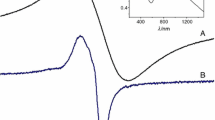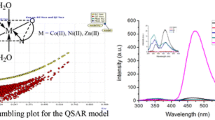Abstract
Alkaline earth metal (Mg2+, Ca2+, Sr2+, Ba2+) complexes of guanine (Gu), a purine-based nucleobase were synthesized. The characterization of these complexes involved elemental analysis (CHN), determination of metal and chloride contents, FTIR, UV–Visible, 1H-NMR spectroscopy, thermal analysis (TGA, DSC), molar conductance, and PXRD measurements. Based on the elemental analysis, the molecular formulae of the complexes were proposed as [Mg(Gu)2Cl2]·4H2O, [Ca(Gu)2Cl2]·3H2O, [Sr(Gu)3Cl2]·5H2O and [Ba(Gu)3Cl2](Gu)·5H2O. The molar conductance measurement showed that the complexes were non-electrolytic. The mode of chelation of guanine through N(7) and O(6) sites was explained using FTIR and 1H-NMR spectral analysis. Thermal analysis in a nitrogen atmosphere showed that the complexes were fairly stable up to 100 °C, with decomposition starting above this temperature and indicating the presence of hydrated water. The crystallite size, microstrain, and dislocation density of the complexes were determined using XRD data. The antibacterial and antifungal activities of guanine and its complexes were screened against five gram-positive, eight gram-negative bacteria, and three fungi. Guanine did not exhibit any antibacterial activity, while the metal complexes showed significant antibacterial and antifungal activities. In vitro cytotoxicity testing revealed that the alkaline earth metal complexes exhibited potential cytotoxic activity, with LC50 values ranging from 18.55 to 40.61 µg mL−1. HeLa cervical cancer cell lines were used to investigate the anticancer activity of metal complexes, and each complex demonstrated cytotoxicity toward HeLa cell lines.
























Similar content being viewed by others
References
Aras MA, Hara H, Hartnett KA, Kandler K, Aizenman E (2009) Protein kinase C regulation of neuronal zinc signaling mediates survival during preconditioning. J Neurochem 110(1):106–117. https://doi.org/10.1111/j.1471-4159.2009.06106.x
Badr IHA, Zidan WI, Akl ZF (2012) A novel neutral carrier for uranyl ion based on a commercially available aminophosphate derivative: evaluation in membrane electrodes and nuclear safeguards applications. Electroanalysis 24(12):2309–2316. https://doi.org/10.1002/elan.201200311
Bariyanga J, Theophanides T (1985) Synthesis, FT-IR and 1H NMR studies of alkali and alkaline earth metal complexes with guanosine. Inorg Chim Acta 108(2):133–140. https://doi.org/10.1016/s0020-1693(00)81626-6
Brown DB, Khokhar AR, Hacker MP, Lokys L, Burchenal JH, Newman RA, McCormack JJ, Frost D (1982) Synthesis and antitumor activity of new platinum complexes. J Med Chem 25(8):952–956. https://doi.org/10.1021/jm00350a013
Connors TA, Roberts JJ (1977) Platinum Coordination Complexes in Cancer Chemotherapy. Springer-Verlag, New York
Gagliardi L, Pyykkö P (2003) Cesium and barium as honorary d elements: CsN7Ba as an example. Theor Chem Acc 110(3):205–210. https://doi.org/10.1007/s00214-003-0485-8
Glavin DP, Schubert M, Bada JL (2002) Direct isolation of purines and pyrimidines from nucleic acids using sublimation. Anal Chem 74(24):6408–6412. https://doi.org/10.1021/ac0259663
Greenwood NN, Earnshaw A (1997) Chemistry of the Elements, 2nd edn. Butterworth-Heinemann
Islam A, Sayeed A, Khan GR, Mosaddik MA, Bhuyan MSA (2002) Terpenes from bark of Zanthoxylum budrunga and their cytotoxic activities. Rev Latinoam Quim 30(1):24–28
Islam S, Debnath T, Bakshi PK (2022) Cobaloxime complexes: synthesis, characterization and thermal decomposition kinetics of complexes. J Bangladesh Chem Soc 33(2):67–72
Jerigová M, Heske J, Kühne T et al (2022) C1N1 Thin Films from Guanine Decomposition Fragments. Adv Mater Interfaces 10(6):2202061. https://doi.org/10.1002/admi.202202061
Kamalakannan P, Venkappayya D (2002) Synthesis and characterization of cobalt and nickel chelates of 5-dimethylaminomethyl-2-thiouracil and their evaluation as antimicrobial and anticancer agents. J Inorg Biochem 90(1–2):22–37. https://doi.org/10.1016/s0162-0134(02)00413-0
Limwongyut J, Moreland AS, Nie C, Read de Alaniz J, Bazan GC (2022) Amide moieties modulate the antimicrobial activities of conjugated oligoelectrolytes against gram-negative bacteria. Chemistry Open. https://doi.org/10.1002/open.202100260
Lipscomb WN, Sträter N (1996) Recent advances in zinc enzymology. Chem Rev 96(7):2375–2434. https://doi.org/10.1021/cr950042j
Lunagariya MV, Thakor KP, Kanthecha DN, Patel MN (2018) Synthesis, characterization and biological applications of substituted pyrazolone core based platinum(II) organometallic compounds. J Organomet Chem 854:49–63. https://doi.org/10.1016/j.jorganchem.2017.11.012
Malhotra E, Kaushik NK, Malhotra HS (2006) Synthesis and studies of ionic chelates of hafnocene with guanine. Indian J Chem 45:370–376
Masoud MS, Soayed AA, Ali AE (2004) Complexing properties of nucleic-acid constituents adenine and guanine complexes. Spectrochim Acta A Mol Biomol Spectrosc 60(8–9):1907–1915. https://doi.org/10.1016/j.saa.2003.09.025
Mehta JV, Gajera SB, Thakor P, Thakkar VR, Patel MN (2015) Synthesis of 1,3,5-trisubstituted pyrazoline derivatives and their applications. RSC Adv 5(104):85350–85362. https://doi.org/10.1039/c5ra17185g
Meyer B, Ferrigni N, Putnam J, Jacobsen L et al (1982) Brine shrimp: a convenient general bioassay for active plant constituents. Planta Med 45(05):31–34. https://doi.org/10.1055/s-2007-971236
Mote V, Purushotham Y, Dole B (2012) Williamson-Hall analysis in estimation of lattice strain in nanometer-sized ZnO particles. J Theor Appl Phys 6(1):6. https://doi.org/10.1186/2251-7235-6-6
Nakamoto K (2009) Infrared and Raman Spectra of Inorganic and Coordination Compounds: Applications in Coordination, Organometallic, and Bioinorganic Chemistry, 6th edn. John Wiley & Sons, New York
Ramadan RM, Mahmoud WH et al (1993) The synthesis, spectral and magnetic properties of the complexes of chromium with chrysenequinone and chrysenequinonemonoxime. Spectrochem Acta Part a: Molecular Spectroscopy 49(1):117–124. https://doi.org/10.1016/0584-8539(93)80266-d
Romerosa A, Suarez-Varela J et al (1997) Synthesis and molecular structure of the first metal complex of an analogue of Guanine with PdII−C(8) binding. Inorg Chem 36(17):3784–3786. https://doi.org/10.1021/ic961334l
Saleem M, Fang L et al (2012) Effect of zinc acetate concentration on the structural and optical properties of ZnO thin films deposited by Sol-Gel method. Intl J Phy Sci. https://doi.org/10.5897/ijps12.219
Sultana C, Aziz M et al (2003) In vitro antimicrobial screening of three cadmium coordination complexes and two addition compounds of antimony and arsenic. Pak J Biol Sci 6(5):525–527. https://doi.org/10.3923/pjbs.2003.525.527
Syoichi S, Sakaguchi T (1978) Complexes between nucleic acid bases and bivalent metal ions. II. Complexes formed by guanine or cytosine, and zinc(II). Chem Pharm Bull 26(10):2941–2951. https://doi.org/10.1248/cpb.26.2941
Tweedy BG (1964) Plant extracts with metal ions as potential antimicrobial agents. Phytopathology 55(8):910–914
Wang Q, Pan S et al (2019) Octa-coordinated alkaline earth metal–dinitrogen complexes M(N2)8 (M=Ca, Sr, Ba). Nat Commun. https://doi.org/10.1038/s41467-019-11323-5
Yu C-Y, Yu Y, Gong LD, Yang Z-Z (2012) Mg2+/Ca2+ binding to DNA bases: a quantum chemical method and A\BEEMσπ/MM fluctuating charge model study. Theor Chem Acc. https://doi.org/10.1007/s00214-012-1098-x
Zhang L, Peng X-M et al (2013) Comprehensive review in current developments of imidazole-based medicinal chemistry. Med Res Rev 34(2):340–437. https://doi.org/10.1002/med.21290
Acknowledgements
The authors are grateful to the Department of Pharmacy, State University of Bangladesh for providing laboratory support to carry out the biological activity of the complexes.
Funding
No funding was received.
Author information
Authors and Affiliations
Corresponding author
Ethics declarations
Conflict of interest
The authors declare that they have no conflict of interest.
Additional information
Publisher's Note
Springer Nature remains neutral with regard to jurisdictional claims in published maps and institutional affiliations.
Rights and permissions
Springer Nature or its licensor (e.g. a society or other partner) holds exclusive rights to this article under a publishing agreement with the author(s) or other rightsholder(s); author self-archiving of the accepted manuscript version of this article is solely governed by the terms of such publishing agreement and applicable law.
About this article
Cite this article
Islam, S., Asaduzzaman, Simol, H.A. et al. Synthesis, characterization, and evaluation of the antimicrobial, cytotoxic properties of alkaline earth metal complexes containing the nucleobase guanine. Chem. Pap. (2024). https://doi.org/10.1007/s11696-024-03494-3
Received:
Accepted:
Published:
DOI: https://doi.org/10.1007/s11696-024-03494-3




